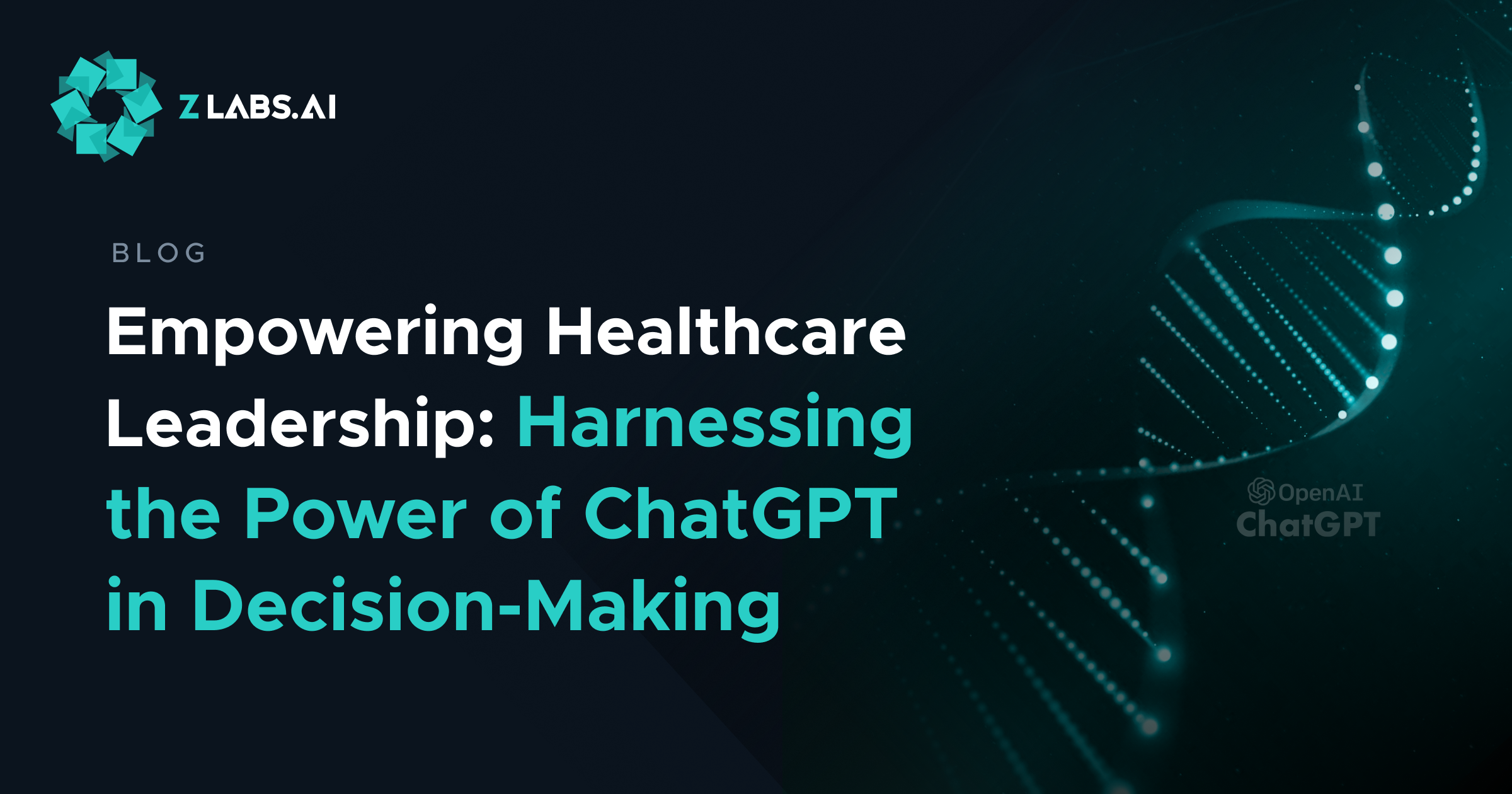Drive Healthcare Innovation with ChatGPT Insights | ZLabs Blog
Healthcare, a dynamic and complex industry, is characterized by continual technological evolution, ever-increasing regulatory scrutiny, and the relentless pressure to optimize resources. This sector is fundamentally underpinned by informed decision-making - a critical process with sweeping ramifications on patient outcomes, operational efficiency, and the overall standing of healthcare organizations.
In this challenging milieu, advanced AI tools like OpenAI's ChatGPT emerge as formidable allies to C-suite executives, providing them with the necessary leverage to make informed decisions in the labyrinthine world of healthcare. This article offers a deep dive into the intricacies of healthcare decision-making, the transformative role of ChatGPT, and its potential future implications for the industry.

Confronting the Daunting Challenges of Healthcare Decision-Making
Steering the helm of decision-making in healthcare is a daunting task. C-suite executives grapple with numerous crucial factors that shape their choices and strategies. Some of the formidable challenges in this arena include:
-
Balancing cost and quality: Maintaining the equilibrium between high-quality care and fiscal sustainability is an ongoing conundrum for healthcare executives.
-
Navigating regulatory compliance: The healthcare landscape is strewn with a plethora of regulations. Leaders must ensure organizational compliance to avert costly penalties and reputational damage.
-
Safeguarding data privacy: The protection of sensitive patient data is paramount in healthcare. Executives are tasked with implementing robust security measures to avert data breaches and unauthorized access.
-
Adapting to new technologies: The rapid pace of technological evolution in healthcare demands constant adaptation. This requires leaders to identify and integrate new tools and systems that bolster their organizations.
-
Workforce management: Executives must attract and retain a skilled workforce amidst labor shortages and shifting expectations for employee wellbeing and satisfaction.
Harnessing the Power of ChatGPT in Healthcare Decision-Making
OpenAI’s ChatGPT, developed on the advanced GPT-4 architecture, utilizes the prowess of natural language processing to analyze and generate human-like text. This positions it as an indispensable tool for C-suite executives seeking enhanced decision-making support in healthcare. Here's how ChatGPT can augment healthcare decision-making:
-
Data-driven insights: ChatGPT can distill vast volumes of structured and unstructured data into actionable insights, empowering executives to make informed decisions.
-
Risk analysis and mitigation: By examining historical data and identifying trends, ChatGPT can pinpoint potential risks and propose strategies for risk mitigation.
-
Time and cost savings: By automating various data analysis and decision-making processes, ChatGPT can significantly cut down time and resources, liberating executives to concentrate on other strategic imperatives.
-
Customized solutions: ChatGPT can be tailored to the specific needs of individual healthcare organizations, ensuring that its insights and recommendations are contextually relevant and actionable.
Numerous healthcare organizations have successfully integrated ChatGPT, reaping benefits such as improved operational efficiency, enhanced patient outcomes, and reduced costs.
Exemplifying the Success of ChatGPT in Healthcare Decision-Making
-
Hospital resource allocation: A leading hospital system harnessed the power of ChatGPT to analyze patient data, forecast service demand, and optimize resource allocation. This yielded reduced wait times, increased patient satisfaction, and more efficient use of resources.
-
Clinical trial design: A pharmaceutical firm leveraged ChatGPT to identify trends and patterns in clinical trial data, thereby designing more effective trials and streamlining their drug development process.
-
Population health management: A public health agency employed ChatGPT to process and analyze large community health datasets. This aided them in identifying at-risk populations, developing targeted interventions, and allocating resources efficiently.
ChatGPT's Future Implications in Healthcare Decision-Making
ChatGPT's potential to revolutionize healthcare decision-making is vast, opening a plethora of opportunities for further innovation and development:
-
Enhanced predictive capabilities: With AI technology advancing at a rapid pace, future versions of ChatGPT could offer even more precise predictions of healthcare trends, patient outcomes, and resource needs. This would enable more proactive and targeted decision-making.
-
Integration with other AI tools: By merging ChatGPT with other AI technologies, such as machine learning algorithms and computer vision, healthcare organizations could craft more comprehensive and robust decision-making solutions.
-
Real-time decision support: ChatGPT could evolve to provide real-time decision support for C-suite executives, empowering them to make more informed decisions in time-critical situations.
-
Improved accessibility and scalability: As ChatGPT becomes more widely accessible and affordable, it could democratize advanced decision-making tools for smaller healthcare organizations and those in low-resource settings.
Strategic Recommendations for C-Suite Executives
As AI technologies like ChatGPT reshape healthcare decision-making, it's crucial for C-suite executives to:
-
Stay ahead of AI advancements: Regularly update your understanding of AI technologies and their potential applications in healthcare to leverage emerging opportunities.
-
Invest in AI integration: Dedicate resources to adopting and integrating AI tools like ChatGPT into your organization. This will optimize decision-making processes and propel better outcomes.
-
Foster a culture of innovation: Promote a mindset that embraces technology and innovation among your teams. This encourages continuous learning and adaptation.
-
Prioritize data privacy and security: Ensure that the implementation of AI tools doesn't compromise data privacy and security. Establish robust data governance policies and practices.
In Conclusion
In an era marked by disruptive advancements in AI, tools like ChatGPT hold the potential to radically transform healthcare decision-making. By offering valuable insights, automating processes, and enabling better risk analysis, ChatGPT can become a potent tool in the hands of healthcare decision-makers.
The time is ripe for C-suite executives to embrace ChatGPT and other AI technologies to amplify their decision-making capabilities. This can ultimately lead to improved patient healthcare outcomes, increased operational efficiency, and more resilient organizations. By staying informed about AI advancements, investing in AI integration, fostering a culture of innovation, and prioritizing data privacy and security, executives can ensure that their organizations continue to lead in the healthcare industry.